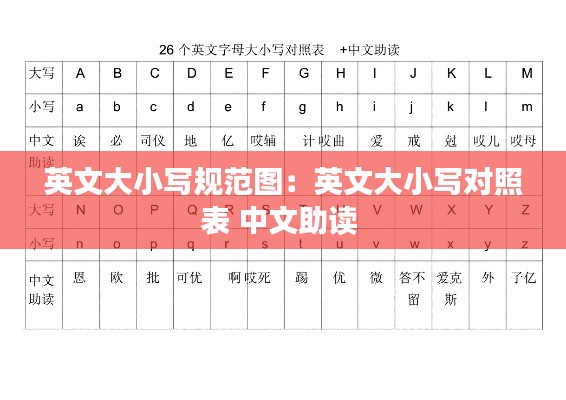Introduction to English Capitalization Rules
English is a versatile language with its own set of rules and conventions. One of the fundamental aspects of English grammar is the use of capitalization, which is essential for clear communication and readability. In this article, we will explore the various aspects of English capitalization rules, providing a comprehensive guide to help you navigate the nuances of capitalizing words correctly.
Capitalizing the First Letter of a Sentence
The most basic rule of capitalization in English is that the first letter of every sentence should be capitalized. This rule applies to all types of sentences, including statements, questions, and exclamations. For example:
“The sun rises in the east.”
“Did you enjoy the movie?”
“Wow! That was an amazing performance!”
This rule ensures that the beginning of each sentence is distinct and easily recognizable.
Capitalizing Proper Nouns
Proper nouns are names of specific people, places, organizations, and things. They should always be capitalized. For instance:
“John is a doctor.”
“New York is a city.”
“The United Nations is an international organization.”
It is important to note that common nouns, which are the names of general categories or types, should not be capitalized unless they are at the beginning of a sentence or part of a title.
Capitalizing Titles and Headings
When writing titles or headings, it is common practice to capitalize the first letter of each major word. This includes nouns, verbs, adjectives, adverbs, and pronouns. However, articles (a, an, the), conjunctions (and, but, or), and prepositions (in, on, at) are typically not capitalized unless they are the first word in the title. Here are some examples:
“The Great Gatsby”
“Chapter 3: The Journey to the East”
“The Impact of Climate Change on Coastal Cities”
It is important to note that some style guides may have different rules for capitalizing titles, so it is always best to refer to the specific guidelines you are following.
Capitalizing Days of the Week, Months, and Holidays
Days of the week, months of the year, and holidays are always capitalized. For example:
“Monday is the first day of the week.”
“March is a beautiful month.”
“Christmas is a time for celebration.”
This rule applies to both singular and plural forms of these nouns.
Capitalizing Titles Before Names
When using titles before names, they should be capitalized. For instance:
“Dr. Smith is a renowned scientist.”
“Captain Johnson is in command of the ship.”
“Judge Wilson is presiding over the trial.”
However, if the title is used on its own or as a part of a phrase, it may not be capitalized. For example, “The captain of the ship is experienced.”
Capitalizing the First Letter of Quotations
When quoting a sentence or a phrase, the first letter of the quotation should be capitalized. For example:
“‘I have a dream,’ Martin Luther King Jr. said.”
“‘The pen is mightier than the sword,’ as the saying goes.”
This rule applies to both direct and indirect quotations.
Capitalizing Acronyms and Initialisms
Acronyms and initialisms, which are abbreviations formed from the initial letters of words in a phrase, should be capitalized. For example:
“NASA”
“UNESCO”
“BBC”
It is important to note that if an acronym is used in the middle of a sentence, it should be followed by periods. For example, “The International Space Station, or ISS, is a marvel of modern engineering.”
Capitalizing the First Letter of Sentences in a Series
When listing items in a series, the first letter of each sentence should be capitalized. For example:
转载请注明来自广州贝贝鲜花礼品网,本文标题:《英文大小写规范图:英文大小写对照表 中文助读 》











 蜀ICP备2022005971号-1
蜀ICP备2022005971号-1
还没有评论,来说两句吧...